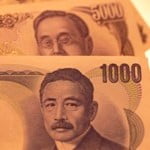 Japan can’t seem to catch a break. On Wednesday, for instance, Japan’s Finance Ministry reported that Japanese exports increased 6.4 percent to $51.2 billion in January from a year earlier. Unfortunately, imports rose even faster…climbing 7.3 percent to $68.6 billion.
Japan can’t seem to catch a break. On Wednesday, for instance, Japan’s Finance Ministry reported that Japanese exports increased 6.4 percent to $51.2 billion in January from a year earlier. Unfortunately, imports rose even faster…climbing 7.3 percent to $68.6 billion.
In effect, Japan, as a whole, spent $17.4 billion more on goods from abroad than they sold. The difference was made up with debt: corporate debt, government debt, and private debt.
Naturally, this new debt will exacerbate Japan’s 230 percent government debt to GDP ratio, which is the largest percentage of any industrialized nation on the world. This will also be compounded by the fact that Japan’s economy shrank 0.4 percent annualized during the fourth quarter of 2012…marking the third straight quarter of contraction. If this sounds bad it’s because it is. Yet Japan’s skid into economic oblivion is only beginning to pick up real steam.
Japan’s trade deficit for 2012 widened to $78 billion. But that’s nothing. If things continue the way they did in January, Japan’s trade deficit for 2013 will widen to $208 billion. This is exactly what Japan’s Prime Minister, Shinzo Abe, is trying desperately to prevent.
The problem for Abe, however, is that his actions are not improving the trade deficit. They’re doing the opposite; they’re making it worse. Here’s what we mean…
Infinite Complexities
From our far off vantage point, gazing out across the Pacific Ocean toward Japan from our perch above San Pedro Bay, it appears Abe believes the economy works like a Swiss Watch…or a Turbo Encabulator. He seems to think he can twist a couple monetary knobs and yank down on several fiscal levers and soon the economy will be blazing along like a well-oiled machine.
Abe perceived the trade deficit problem to be the effect of a strong yen. To reverse the outgoing flow of money from trade he figured all he must do is cheapen the yen. Subsequently, the thinking goes, Japanese products will be priced more competitively in global markets, Japan will sell more products to people abroad, and, before long, their trade balance will be back in the black.
Japan can then use these surplus funds to pay down its debt. It all seems so simple, obvious, and agreeable. But, regrettably, machines malfunction. Process system waste streams backup the flow line.
Where an economy’s concerned, things are infinitely more complex. An economy’s far too extensive for all contingencies to be fathomed. For an economy’s neither physical nor mechanical…it’s both of these things. Plus, it’s much, much more; it’s social.
An economy’s participants are not entirely predictable. One person likes chocolates. Another likes carrot sticks. Yet a third likes neither…instead, they prefer gum balls – but only red ones.
So, too, its participants are not entirely rational. Under certain circumstances they’ll pay several thousand dollars for a Beanie Baby. Under other circumstances they’ll yank the crotch out of store clerk’s brand-new jeans for a Tickle Me Elmo.
Given this predictable unpredictability, how is it that Abe believes he can improve upon the economy with plans and policies? Here’s another way to look at it…
The Best Laid Schemes of Mice and Men
“The best laid schemes of mice and men / Go often awry, And leave us nothing but grief and pain, For promised joy!” wrote Robert Burns in 1785.
What Burns may have meant is that things don’t always work out according to plan. What’s more, even the best of plans can cause grief and pain. In regards to Japan, the inhabitants of the Land of the Rising Sun are already being punished by Abe’s scheme for weakening the yen.
You see, the first part of Abe’s scheme has gone flawlessly. Sale of consumer products from Japanese exporters like Sony and Sharp have increased as the yen’s value has decreased over the last several months. But, after that, things have quickly gone awry.
Japan is resource-scarce. The cheaper yen has inflated the cost of Japan’s imports of crude oil and other commodities. In fact, in January, as reported by AP, “Japan’s imports of crude oil and other fuel rose 8.8 percent to 2.26 trillion yen ($24.1 billion) accounting for over a third of its total import bill.”
In other words, the more Abe weakens the yen to boost exports, the more expensive oil imports become, and the lager Japan’s trade deficit grows. Abe’s best laid plans are worsening the trade problems they were supposed to fix. Obviously, this conundrum was entirely unexpected.
Surely, Omoikane, the Shinto God of wisdom and intelligence, is doubled over in laughter.
Sincerely,
MN Gordon
for Economic Prism
Return from The Best Laid Schemes of Mice and Men to Economic Prism




